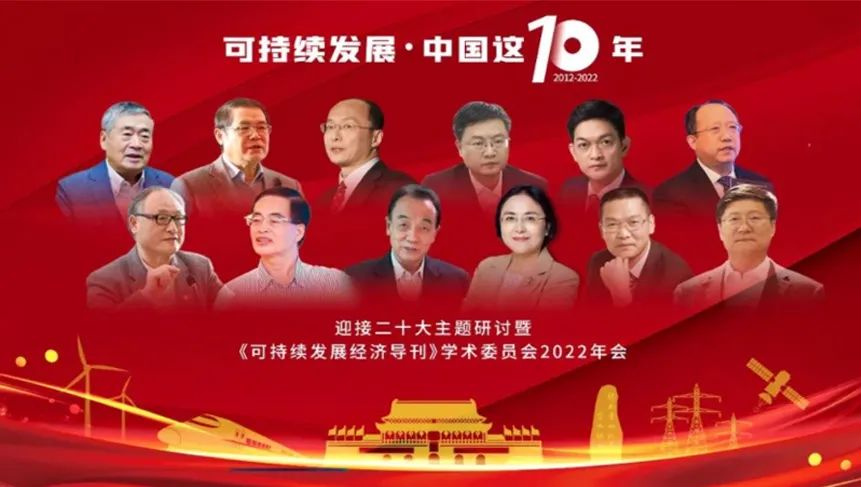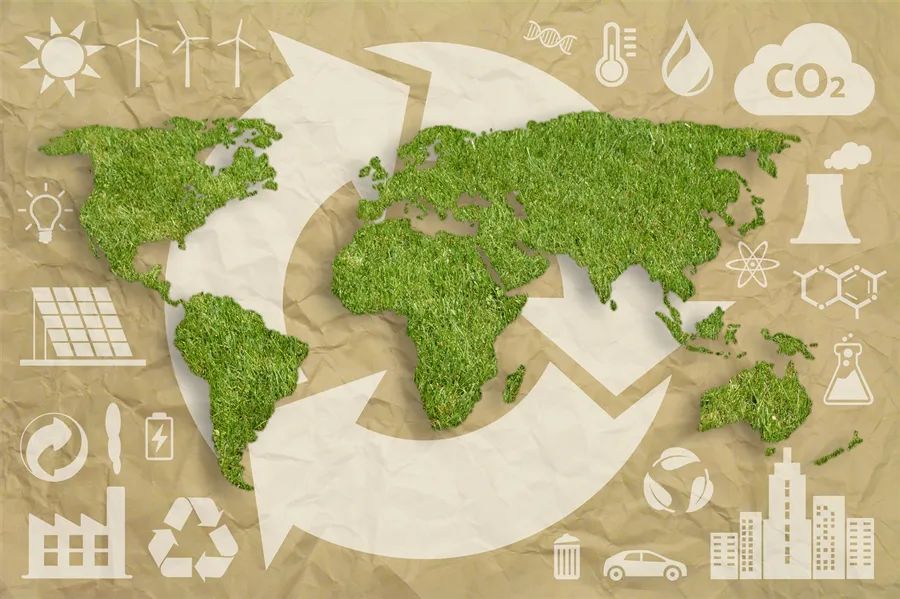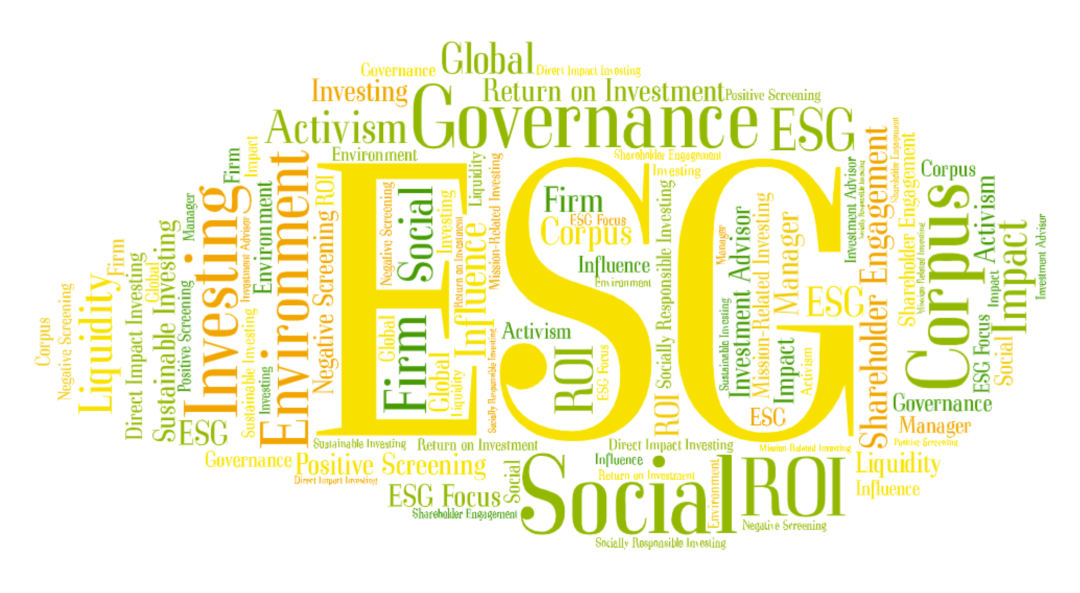Strive for Ten years, Embrace Great Future
2022-11-14GoldenBee责任编辑0
—20th CPC National Congress Symposium · 2022 Annual Meeting of the Academic Committee of China Sustainability Tribune—

China is on the path to promote the United Nations 2030 Sustainable Development Goals. Over the past decade, based on the new development stage, China has faithfully applied the new development philosophy and built a new pattern of development, achieving remarkable results in promoting sustainable economic, social and environmental development.
The 20th National Congress of the Communist Party of China convened on October 16, 2022, which also marks an important point to summarize and review China's sustainable development over the past decade. In order to further review and summarize the past achievements and look forward to the blueprint of sustainable development in the future, the Academic Committee of China Sustainability Tribune held the annual meeting of “Sustainable Development · China in the Past Decade” on September 26. The committee members and other well-known experts and scholars attended the annual meeting and shared their thoughts concerning the sustainable development achievements and progress, thinking and outlook in their respective fields, welcoming the 20th CPC National Congress with fruitful seminar results.
The annual meeting had two sessions, respectively presided over by Prof. Pan Jiahua, Member of the Academic Board, Chinese Academy of Social Sciences (CASS) and Deputy Director of the National Climate Change Expert Committee, and Prof. Zhang Haibin, Vice Dean of School of International Studies, Peking University and member of the National Climate Change Expert Committee, and academic members delivered their keynote speeches and presented their research results and important views.
Focusing on Key Issues of Sustainable Development: Response to Climate Change and Carbon Neutrality

Looking back on the world's response to climate change, Prof. Pan Jiahua reckoned that this decade in addressing climate change witnessed great changes. From Copenhagen Accord, which set the target of temperature rise within 2℃ in an international agreement for the first time in history, to the Paris Agreement, which limits the temperature rise within 1.5℃, the target has become even more focused and clarified over the past ten years. This means that while the direction of development and response remain unchanged, we have embarked on a new route – changing from mitigation to emissions reduction, from fossil fuel energy to zero-carbon energy. This process will not happen overnight, but the change in production methods and production relations needs to be accelerated and that’s the only way to win the future, he added.
Prof. Zhang Binhai described the current status of global climate governance with four "unprecedented" statements, namely, the severity of climate crisis, the global efforts to address climate change, the rapid development of global green and low-carbon technologies, and the severity and complexity of international environment facing global climate governance. In the context of carbon neutrality, major countries around the world have increased their relevant deployment. Zhang Binhai pointed out that the climate game of major countries is showing some new features and ways. The competition around the modernization of green low-carbon governance system and governance capacity, the competition in the field of renewable energy, the competition around standard-setting power and discourse power of the international climate orders and rules, the competition around the international moral high ground of addressing climate change and the competition for the leadership of global climate governance are all getting more and more intense.
In coping with climate change and building technology system of carbon neutrality, Huang Jing, Director of the Administrative Center for China’s Agenda 21, introduced the background of addressing climate change. On the one hand, the presence of greenhouse gases and the resulting greenhouse effects are important environmental conditions for human survival on Earth; on the other hand, the rapid increase of greenhouse gas emissions from human activities since industrialization has brought about increasingly serious climate risks. The current global challenge is the continuous growth of greenhouse gas emissions and the insufficient mitigation actions and commitments. It is from the perspective of a community with a shared future for mankind and protection of the Earth that China has made the commitment to achieve carbon neutrality by 2060, taking into account its own specific national conditions. He believed that to achieve the goal of carbon neutrality on schedule, science and technology have to play an important supporting roles. We need to assess the current status of greenhouse gas emissions comprehensively, analyze the demand for carbon emission reduction technologies, and build a technology system of carbon neutrality, including energy efficiency, zero-carbon electricity power energy, zero-carbon non- electricity power energy, fuel/raw material and process substitution, carbon capture utilization and storage (CCUS), carbon sink and integrated coupling optimization, etc.
Focusing on the circular economy and the achievement of carbon neutrality, Wen Zongguo, Tenured Professor at School of Environment, Tsinghua University and Director of the Industrial Energy Conservation and Green Development Evaluation Center, pointed out in his speech that the category and quantity of material resources produced and used by human society are increasing rapidly, so developing circular economy is pivotal in achieving the carbon neutrality target in the future. Many countries, including China, have made very clear commitments to reduce carbon emissions. Prof. Wen Zongguo and his team summarized six carbon reduction paths for developing circular economy: green design from the source to avoid waste; optimization of product production and process flow; improvement of energy use efficiency and clean fuel substitution; substitution of waste or renewable materials for raw materials; innovation in product use and service system; graded and classified disposal of post-consumer waste.
Exploring the Chinese Way to Contribute to Sustainable Development: Theory and Practice

Professor Zhu Dajian, Director of Sustainable Development and Management at Tongji University, pointed out in his speech that, as China’s ideology and wisdom, ecological civilization should not only contribute to sustainable development but also to the theoretical research on it - sustainability science. He believed that if the first wave of global sustainable development arose in Europe and America, China has become the largest sustainable development laboratory in the past decade in the world. In the next decade, China’s ecological civilization will not only contribute to the global sustainable development practice but also to the theoretical research. As for how it tests and deepens sustainability science, he emphasized the important leading role of the theory and practice of China’s ecological civilization in deepening the development of sustainable science from five basic issues.
Green development is the main theme of China’s economic development in the new era. Yang Chunping, Director of the Circular Economy Research Center of Institute of Economic System and Management under the National Development and Reform Commission, pointed out that China should achieve modernization as a whole as well as promote green development to achieve carbon peaking and carbon neutrality goals with unprecedented challenges and opportunities. Circular economy is the basic path to achieve green development. It is crucial for China and the world to achieve sustainable development by exploring a resource-conserving, environment-friendly and low-carbon development model. Reviewing the development of China’s circular economy in the past decade, he proposed four main paths to develop the circular economy to achieve carbon emission reduction and promote carbon neutrality: The first is to promote the process reengineering of the heavy chemical industry through the recycling and utilization of renewable resources; the second is to realize resource and energy conservation and pollution reduction throughout the production process by comprehensively promoting the circular economy model for key industries; the third is carbon recycling; and the fourth is to develop remanufacturing.
The past decade has seen brilliance in China’s transportation development. Professor Lu Huapu, Director of the Institute of Transportation Research at Tsinghua University, summarized the development and changes in China’s transportation in the past decade, as well as the resulted profound and transformative changes to China’s economy and society in his speech. He pointed out that China’s construction technologies for high-speed railways, expressways, super large bridges and tunnels, port construction in deep-water areas, large airport projects and etc. have reached the international advanced level. A number of transportation superprojects shocked the world, and a large number of transportation equipment represented by self-developed high-speed railways has become a new card of “Made in China”. He summarized the main manifestations of the changes in China’s economy and society brought about by China’s transportation development: first, China’s geographical location characteristics and spatio and temporal distances are changed; second, the development becomes the key to poverty alleviation; third, the lives of the people in frontiers and mountain areas for thousands of years have been uplifted with sense of happiness; fourth, social and economic development has been promoted. Looking forward to the future, he believes that transportation will become a frontier in China’s modernization, and the sustainable development of transportation will be accelerated with the characteristics of greening, intelligence, integration, etc.
Sustainable development is inseparable from the support of talents. In his keynote speech, Dr. Shi Gendong, Executive Director of the UNESCO Project on Education for Sustainability Development in China, summarized various manifestations of the unsustainable development of people in the current society and culture from the the urgency of ecological civilization – education for sustainable development, and especially mentioned the basic strategies: First, deepen the theoretical research on ecological civilization and education for sustainable development. Second, prepare education materials about carbon peaking and carbon neutrality, and incorporate them into the national education system. Third, carry out the innovation of ecological civilization and education for sustainable development. Fourth, connect ecological civilization education in schools with social forces in environmental resources and climate change. Fifth, encourage young people to participate in the construction of urban and rural ecological civilization. Sixth, strengthen the construction of a lifelong learning system led by ecological civilization and education for sustainable development. Seventh, expand the planting area of vegetable and fruit-bearing forests in institutions, schools and communities, as well as the urban ecological space. He pointed out that when the sustainable development of society, economy, environment, culture as well as that of individuals among all citizens have been improved to a more ideal state, the vision of an ecological civilization will become a reality.
Focusing on Enterprises to Promote Sustainable Development: ESG and CSR

Zhu Chunquan, Head of Nature and Ecological Civilization Initiatives for Greater China of World Economic Forum (WEF), pointed out in his speech that the global risk reports released by WEF in recent years show that environmental issues have gradually become the most concerned and the riskiest restrictive factor for human sustainable development. At present, more than 20 environmental protection organizations and international institutions have put forward and supported the global “Nature-Positive” goal, hoping the biodiversity status will be better than the baseline level in 2020 by 2030. The achievement of this goal depends on the joint efforts of the industrial and commercial enterprises, also brings huge business opportunities. According to the Seizing Business Opportunities in China’s Transition Towards a Nature-positive Economy released by WEF in January 2022, through 15 transformations under the three major systems, namely, the food, land and ocean use system, the infrastructure and built environment system, and the energy and extraction system, China is expected to bring USD 1.9 trillion of new business value and 88 million jobs by 2030. In this context, WEF is also positively promoting the “Action Plan for China’s Industry and Commerce” to promote the leading of industry and commerce for the nature-positive transformation and support the construction of ecological civilization and the goal of global biodiversity.
In the ten years of sustainable development, the concept and development of corporate social responsibility (CSR) have also changed quietly. Professor Qian Xiaojun, Vice President of Schwarzman Scholars and Director of Research Center for Green Economy and Sustainable Development of Tsinghua University, focused on the analysis of the relationship between ESG (environmental, social, and governance) and CSR in her speech. She pointed out that ESG is an extension of CSR in financial investment, a force for enterprises to fully fulfill their social responsibilities, and a powerful financial lever to promote enterprises’ sustainable development. She stressed seeing and understanding ESG from four perspectives of the country, society, enterprises and international trends, and proposed that ESG would not only strengthen the international market advantage of Chinese enterprises but also be the key to implementing the new development concept and the way for enterprises to improve their competitiveness. Therefore, enterprises should be prepared, take the initiative, and speak with achievements and facts. She expects that Chinese enterprises can actively operate in accordance with the principles of ESG and contribute to making China a responsible country and the common future of mankind.
Focusing on the ESG hot spot in the field of sustainable development investment and financing, Yin Gefei, Chief Expert of GoldenBee and Deputy Secretary of ISO 26000 Stakeholder Global Network (SGN), said that the core of the role of ESG lies in financial institutions. At present, the biggest challenge ESG faces is that financial institutions cannot have visual and measurable ESG information data as well as effective comparisons. Investment results cannot be measured effectively. Therefore, he put forward the concept of “ESG Net Value”, and carry out monetary measurements for the value of ESG by integrating ESG dimensions and formulas. This is a new concept for the market and entire capital market. If earnings per share and ESG net value per share are added together, the real value of each company per share will be obtained, which is of great value for promoting sustainable development financing and sustainable transformation of enterprises.
Best Practices
- The 100-year brand — Air Liquide also has a sense of juvenile
- Beijing Public Transportation Corporation: Developing green transportation to build a harmonious and livable capital
- CGN: Building a modern factory in barren deserts and developing a new win-win cooperation model along “Belt and Road”
Upcoming Event

All the materials on the site “Source: XXX (not from this site)” have been reprinted from other media. They do not imply the agreement by the site.
All the materials with “Source: CSR-China Website” are the copyright of CSR-China Website. None of them may be used in any form or by any means without permission from CSR-China Website.
GoldenBee Official WeChat
Copyright © Csr-china.net All Right Reserved.
京ICP备19010813号










